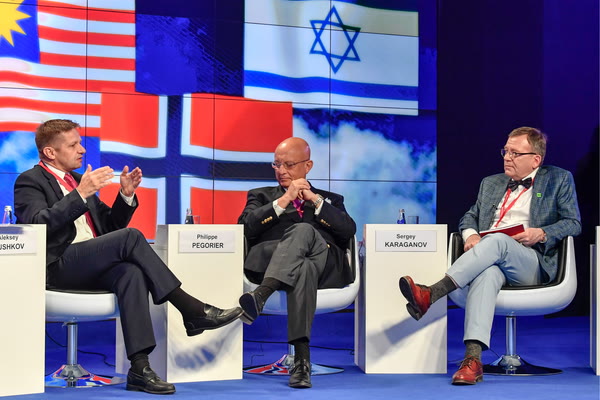
From the Atlantic to the Pacific: Creating a Space for Trust
KEY FINDINGS
Political crisis does not reduce the interest of businesses towards international cooperation
"We're talking about a trade war between the US and China, but companies want to trade, not fight. Therefore, it seems to me that the semblance of the crisis is more of a political phenomenon, when politicians use the rhetoric for domestic preservation," Aleksey Chekunkov, Chief Executive Officer, Far East and Baikal Region Development Fund.
"In spite of the political problems, business people contact each other, move towards trust, create trust with Europeans, with Russians. 70% of investments in Russia are European investments, 10% are American," Philippe Pegorier, President for Russia and CIS, Alstom.
"Certain governments wage a cold war against the Russian government these days. But the Western society does not wage a cold war against the Russian society. At first glance, we do have a cold war on our hands, but in business everything is more or less in order," Alexei Pushkov, Сhairman of the Federation Council Commission on Information Policy.
Russia and China become strategic partners
"Previously, China was somehow outside of the Russian market for political reasons. Naturally, China returns to Russia, and it will increase its market share just as it wants to increase one in other countries of the world. I don’t think that Russia is moving towards China. China is now restoring its position in Russia," Philippe Pegorier.
"China and Russia complete each other well economically. China has a significant, even massive potential in infrastructure and industry. Central Asia is extremely important, but it alone will not move the arrow when it comes to Europe or the Pacific," Xu Sitao, Chief Economist at Deloitte, China.
"The last two US administrations did everything possible, they are pushing Moscow and China to embrace each other, they do everything to bring Russia and China closer to each other. The Chinese understand very well that if the campaign to isolate Russia is successful, China will be next," Alexei Pushkov.
PROBLEMS
Trade wars and sanctions have a destructive effect on free trade
"We encounter efforts to destroy confidence <…> basically the only global power is engaged in this and it has taken the path that says America comes first and foremost, and the interests of the United States are always primary, regardless of the balance of interests. This contradicts the need to restore confidence all over the world," Alexei Pushkov.
"The global economy is moving towards protectionism, then global restrictions on imports of steel, aluminum, new tariffs, which are related to what China exports. This may be called the beginning of the trade war. The continuing Western economic sanctions against Russia from 2014 in a way demonstrate the beginning of the end of free trade. The list of violations against free trade, unfortunately, keeps growing," Antonio Fallico, Chairman of the Board of Directors, Banca Intesa.
SOLUTIONS
Creating a space for trust between nations
"If interests coincide, if nations move on in the same direction, then it is possible to work together. <...> A relationship that may conditionally be called trust can be created. But if there is no strong foundation, then in this case nothing will work out. It is necessary to understand that cooperation is always better," Sergey Karaganov, Dean, Faculty of World Economy and International Affairs, National Research University Higher School of Economics.
"I don’t see any contradictions to China, Russia, Germany, not necessarily creating an alliance, but providing large synergy," Xu Sitao said.
The choice in favor of the European orientation of Russia
"Many in Europe say these days <…> that Russia is moving towards the East and is less committed to Western Europe. And that, of course, is a paradigm shift. That is what will be the new difference between Western Europe and Russia. We want to make sure that when we consider political observations, we need to better understand where Russia wants to move. We would like to be closer to Russia. <...> Europe should be together with Russia and strategically understand where to go. And after the United States’ decision on Iran, it has become even more important. We must have a new foundation for confidence and trust," Klaus Mangold, Chairman of the Supervisory Board, TUI.
Forming conditions for economic integration of Europe and Asia
"Asia has a great chance to create something that would unite countries to a greater extent. If you look at such nations as Kazakhstan and Uzbekistan, they develop very well. <...> eventually we will see that Kazakhstan and Uzbekistan can become the engines, the generators of a new strategy. Let's try to help them develop through subsidies, through the EBRD; that will create a good basis for investment," Klaus Mangold.
"We stand for a greater integration with European businesses, for a greater integration of the two unions: the Euro-Asian and the European," Philippe Pegorier.
Counteraction to US pressure
"Trust is a good thing, but we need the rules of the game, changing the rules of the game. We are not in a one-sided world. We have an opportunity to demonstrate that Europe is there. To explain to the United States that of course it is good to defend one’s interests, but also Russia must defend its interests, and Europe too. We must show the United States that they are not alone in the world," Jean-Pierre Thomas, President, Thomas Vendome Investment.
More detailed information is available on the website of the Roscongress Foundation information and analytical system.








